DERIVATIVES
MARKET MODULE
Financial Market Institute in Delhi, Noida & Vaishali
NISM Derivatives Market Module - NISM Series 8

NISM Equity Derivative market module is a one month program. It is an entry-level program for working professionals in the equity derivatives sector. Derivatives are financial security. The underlying instrument is becoming increasingly popular in the world market as a tool for risk management. The Indian derivatives market has been steady over the past few years being an important instrument in financial sector strategy.
Derivates measure the sensitive to undisputedly high especially in hedging against risk. The objective of the derivatives market program is to enable comprehensive knowledge of diverse derivatives products. We’ll also cover financial structure in Indian derivatives market and importance to govern them in the Indian securities market. You can better understand the derivatives market when you learn the risk and regulation associated with products. Besides, you will learn the derivatives market exchange mechanism of trading, clearing, and settlement.
Unique Features of NISM Derivative Market Module
- Demonstrate an advanced knowledge of Indian equity derivatives market
- Extend your knowledge of global trading strategies using derivatives that built using futures and options
- Gain an in-depth understanding of clearing, settlement, risk management
- Explore operational mechanism to equity derivatives markets
- Get actionable knowledge of regulatory environment in which Indian equity derivatives market operate.
- Unravel technical complexities to immediately apply to current career progression.
- A great add-on course for dealers and stock brokers
- Get an entry-level job in stock broking company
- It’s a industry recognize program, a mandate by SEBI
- Practical classes in the live market from faculty with 15 years experience in derivatives market
Certifications
After completing the Derivatives examination students will get:
- IFMC Derivatives Certification
- NISM Derivatives Certification
- Registration Fees – Rs 1700/-
- Program Fee – Rs 1o,ooo/-
- Program Duration 1 Month
- Plus GST
Note: Examination fee of NSE & SEBI certification is extra as given
Pay Full or Partial Course Fees
NISM Derivatives Market Module Detailed Curriculum
Module 1: Derivatives Market Introduction and Fundamentals
- What is Derivatives Market?
- What Are the Types of Derivatives
- Derivatives and Equity Market
- Evolution of Derivatives Market
- Indian Derivatives Market
- Significance of Derivatives
- Risk in Derivatives Market
Module 2: Quantitative Fundamentals
- What is Beta?
- What is R-Square?
- How to do continuous compounding?
- What is a normal distribution?
- What is share prices lognormal distribution?
Module 3: Derivatives Market Volatility
- Historical Volatility (σ)
- ARCH Model
- Exponentially Weighted Moving Average (EWMA)
- GARCH Model
- Implied Volatility
Module 4: Introduction to Forwards
- Contracts
- Selection Criteria
- Stock Selection Criteria
- Criteria for Continued Eligibility of Stock
- Criteria for Re-inclusion of Excluded Stocks
- Index Selection Criteria
- Price Steps and Price Bands for Contracts
- Quantity Freeze for Futures Contracts
- Novation
- Margins Daily Mark-to-Market Settlement
- Final Settlement
- Cost of Carry
- Determining Stock Futures Price (without Dividend)
- Determining Stock Futures Price (with Dividend)
- Determining Index Futures Price (without Dividend)
- Determining Index Futures Price (with Dividend)
- Cash & Carry Arbitrage
- Reverse Cash & Carry Arbitrage
- Convergence of Spot & Futures
- Contango & Backwardation
- Cost of Carry – Commodities
Module 5: Understanding Index
- Introduction to Index
- Significance and economic purpose of Index
- Types of Indices
- Attributes of an Index and concept of impact cost
- Index management
- Major Indices in India
- Applications of Index
Module 6: Introduction to Options and Trading Stratgies
- Basics of options
- Payoff Charts for Options
- Basics of options pricing and option Greeks
- Fundamentals of options pricing
- Overview of Binomial and Black-Scholes option pricing models
- Basics of Option Greeks
- Uses of Options
- Option spreads and their payoff charts
- Straddle: market view and payoff charts
- Strangle: market view and payoff charts
- Covered Call: market view and payoff charts
- Protective Put: market view and payoff charts
- Collar: market view and payoff charts
- Butterfly spread: market view and payoff charts
Module 7: Introduction to Clearing and Settlement system
- Clearing Members, their role and eligibility norms
- Clearing Mechanism and computation of open positions
- Settlement Mechanism for stock and index futures and options
- Understanding margining and mark to market under SPAN
- Risk Management features and position limits
Module 8: Regulatory Frame Work
- Objective of Regulation
- Regulation of Exchanges
- Eligibility for derivative trading
- Regulatory control on contracts
- Risk Management at Clearing
- Different aspects of risks
- Market Manipulation
Module 9: Accounting of Derivatives
- Accounting of Futures and Options contracts
- Taxation of Derivative transaction in securities
Who Can Take Derivatives Market Course?
IFMC Institute derivatives market course is recognize internationally. The derivatives certification endorse individuals and corporate clientele as a validation of knowledge and skills require to enter and progress in a career that employs derivatives such as
- Equity Dealers
- Stock Brokers
- Trading professionals
- Portfolio Manager
- Research Analyst
- Compliance Managers
- Risk Manager
- Treasury Executive
Jobs Opportunity
- Equity Dealer: Work in a stock broking company to advise clients
- Derivative Analyst: Work in financial institution to study historical data, analyze current and past trends. Also, predict the future market.
- Risk Managers: Analyze risk mitigation by hedging position to protect against risk.
- Derivatives Traders: Trade actual instrument with the means of making bids.z
Admission Criteria and Eligibility:
- The candidate should Minimum 12th (Senior Secondary) pass from any reorganization Board/institutions. We always recommend the candidate should pass at least bachelor degree so that it will be the bit easier to provide placements. Graduate students get job placement on the direct payroll in big companies, and 12th students will get placement in small companies or in sub-brokers office.
- *placement guarantee refers to (After getting NCFM and NISM Certification of all 10 modules covered in adv. diploma course).
- All original documents-10th,12th graduation, other professional degree certification and mark sheets must be submitted as a self-attested copy/copies at the branch at the time of admission and originals must be shown to the center In Charge, failing which admission may be cancelled.
- 95% attendence is must during the programme in each module opted by the student.
- Remarks /Recommendation of faculty and center Head will be taken in the record after each class.
- Your certification depends on your Attendance, class assessment, projects, internal exams, NSE exams, Practical classes, Projects and Viva.
- The decision of Center in Charge and center Head will be final.
Query Us















